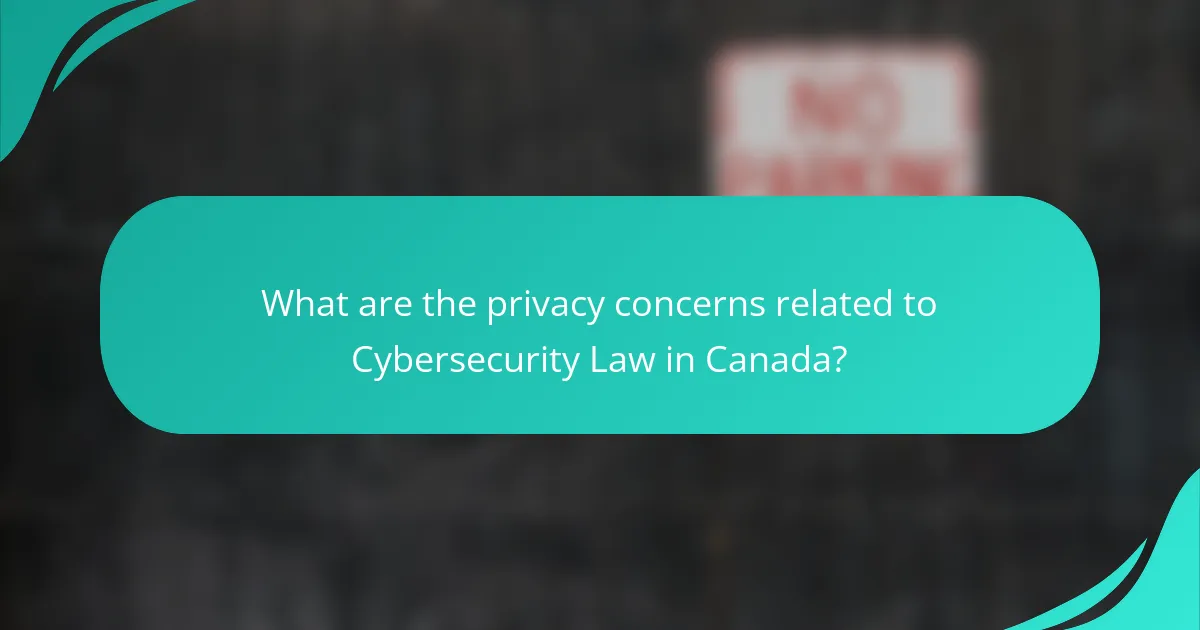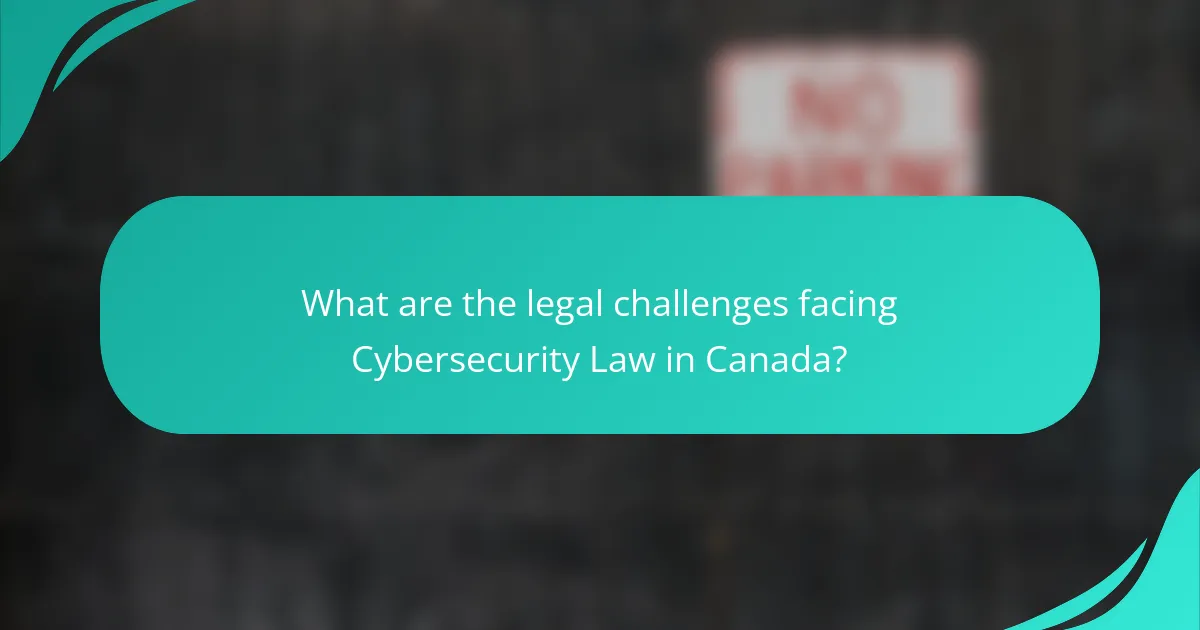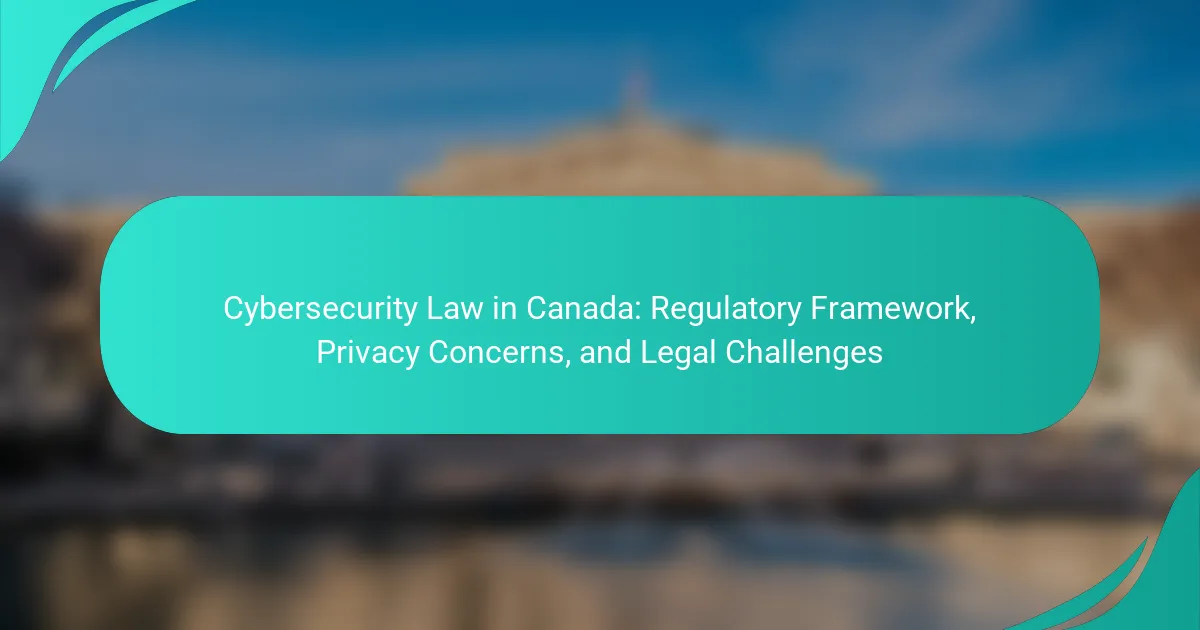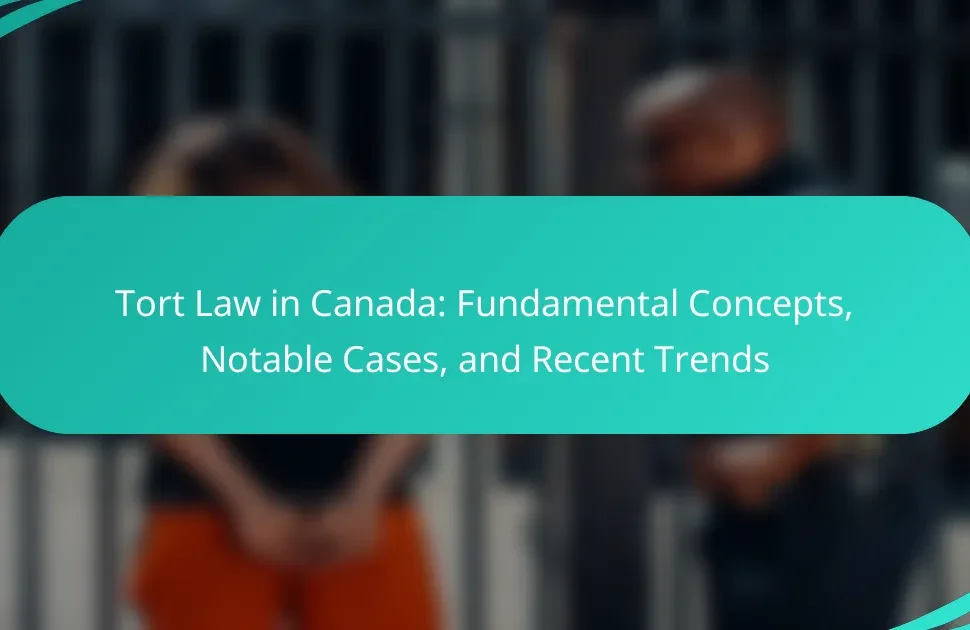
What is Cybersecurity Law in Canada?
Cybersecurity law in Canada encompasses the legal frameworks and regulations governing the protection of digital information and systems. It includes laws that address data breaches, cybersecurity threats, and privacy concerns. Key legislation includes the Personal Information Protection and Electronic Documents Act (PIPEDA) and the Digital Privacy Act. These laws establish requirements for organizations to safeguard personal data and report breaches. Additionally, the Canadian Cyber Security Strategy outlines the government’s approach to enhancing national cybersecurity. Enforcement is carried out by various bodies, including the Office of the Privacy Commissioner of Canada. This legal framework aims to ensure the security and privacy of Canadians in the digital landscape.
How does Cybersecurity Law impact individuals and businesses?
Cybersecurity Law impacts individuals and businesses by establishing legal frameworks for data protection. These laws mandate organizations to implement security measures for personal information. Individuals benefit from enhanced privacy rights and protections against data breaches. Businesses face compliance requirements that can lead to financial penalties for violations. The laws also encourage transparency in data handling practices. For example, the Personal Information Protection and Electronic Documents Act (PIPEDA) enforces strict guidelines on consent and data usage. Non-compliance can result in significant fines, affecting a company’s reputation and financial standing. Overall, these laws shape how data is managed, fostering trust between consumers and businesses.
What are the key components of Cybersecurity Law in Canada?
The key components of Cybersecurity Law in Canada include regulatory frameworks, privacy protection, and compliance requirements. Regulatory frameworks consist of laws like the Personal Information Protection and Electronic Documents Act (PIPEDA) and the Digital Privacy Act. These laws establish guidelines for how organizations must handle personal data. Privacy protection is emphasized through the requirement for organizations to implement security measures to safeguard sensitive information. Compliance requirements mandate that businesses report data breaches to affected individuals and the Office of the Privacy Commissioner. Furthermore, the Canadian Cyber Security Strategy outlines national policies for enhancing cybersecurity resilience. These components collectively aim to protect individuals and organizations from cyber threats while ensuring accountability.
How do these laws protect personal data?
These laws protect personal data by establishing strict guidelines for data collection, storage, and sharing. They require organizations to obtain consent from individuals before processing their personal information. Data protection laws also mandate that organizations implement security measures to safeguard personal data against breaches. Additionally, they grant individuals rights to access and correct their information. Non-compliance with these laws can result in significant penalties for organizations. For instance, the Personal Information Protection and Electronic Documents Act (PIPEDA) enforces these regulations in Canada. This legal framework aims to enhance individuals’ control over their personal data and promote transparency in data handling practices.
What are the main regulatory bodies overseeing Cybersecurity Law?
The main regulatory bodies overseeing Cybersecurity Law in Canada include the Office of the Privacy Commissioner of Canada (OPC) and the Canadian Radio-television and Telecommunications Commission (CRTC). The OPC is responsible for enforcing the Personal Information Protection and Electronic Documents Act (PIPEDA). The CRTC regulates telecommunications and broadcasting, including cybersecurity aspects. Additionally, the Communications Security Establishment (CSE) provides cybersecurity guidance and support to federal entities. These organizations collectively ensure compliance with cybersecurity regulations and protect personal data in Canada.
What roles do the Office of the Privacy Commissioner and other agencies play?
The Office of the Privacy Commissioner (OPC) plays a crucial role in protecting personal information in Canada. It oversees compliance with privacy laws and investigates complaints about privacy violations. The OPC also provides guidance to organizations on best practices for data protection. Additionally, it conducts audits to ensure organizations adhere to privacy regulations. Other agencies, such as the Canadian Radio-television and Telecommunications Commission (CRTC), enforce regulations related to telecommunications and electronic communications privacy. The CRTC also addresses complaints regarding unwanted communications. Together, these agencies work to uphold privacy rights and enhance public trust in data handling practices.
How do these bodies enforce compliance with Cybersecurity Law?
Regulatory bodies enforce compliance with Cybersecurity Law through various mechanisms. They conduct audits and inspections to assess adherence to legal standards. These bodies also issue fines and penalties for non-compliance. They provide guidance and resources to organizations for better compliance practices. Public awareness campaigns are initiated to educate stakeholders about cybersecurity responsibilities. Additionally, they collaborate with law enforcement to investigate breaches and prosecute offenders. For example, the Office of the Privacy Commissioner of Canada oversees compliance with privacy laws and can take action against organizations that fail to protect personal information.

What are the privacy concerns related to Cybersecurity Law in Canada?
Privacy concerns related to Cybersecurity Law in Canada include the potential for unauthorized data access. Individuals fear their personal information may be exposed during cybersecurity incidents. The law mandates organizations to report breaches, which raises concerns about transparency. There is also apprehension regarding how data is collected and stored. Many Canadians worry about government surveillance under the guise of security. Compliance with international standards may lead to cross-border data flow risks. The balance between security measures and individual privacy rights remains a contentious issue. Legal challenges often arise from perceived overreach in data handling practices. These concerns highlight the need for robust privacy protections within the cybersecurity framework.
How does Cybersecurity Law address personal privacy issues?
Cybersecurity Law addresses personal privacy issues by establishing regulations that protect individuals’ data. These laws require organizations to implement security measures to safeguard personal information. They mandate transparency regarding data collection and usage practices. Individuals are granted rights to access and correct their personal data. Compliance is enforced through penalties for non-adherence to privacy standards. For instance, the Personal Information Protection and Electronic Documents Act (PIPEDA) outlines specific obligations for businesses. This legislation aims to enhance consumer trust by ensuring responsible data handling.
What rights do individuals have under Canadian privacy laws?
Individuals have specific rights under Canadian privacy laws. These rights include the right to access personal information held by organizations. Individuals can request corrections to their information if it is inaccurate. They also have the right to withdraw consent for data collection and usage. Privacy laws mandate organizations to protect personal information from unauthorized access. Individuals can file complaints with the Office of the Privacy Commissioner of Canada. The Personal Information Protection and Electronic Documents Act (PIPEDA) governs these rights. PIPEDA ensures transparency in how personal data is collected and used. This legal framework reinforces the importance of individual privacy in Canada.
How do organizations ensure compliance with privacy regulations?
Organizations ensure compliance with privacy regulations by implementing robust data protection policies. They conduct regular audits to assess adherence to legal standards. Training employees on privacy laws is essential for maintaining compliance. Organizations often appoint a Data Protection Officer to oversee compliance efforts. They also utilize privacy impact assessments to identify risks in data handling practices. Additionally, organizations implement technical measures such as encryption to safeguard personal information. Regular updates to privacy policies help organizations align with evolving regulations. These practices collectively ensure that organizations meet their legal obligations regarding data privacy.
What are the implications of data breaches on privacy?
Data breaches significantly undermine individual privacy. They expose personal information, making it vulnerable to misuse. This can lead to identity theft, financial loss, and reputational damage. According to a 2021 report by the Privacy Commissioner of Canada, 57% of Canadians are concerned about their personal data being compromised. Regulatory frameworks, such as the Personal Information Protection and Electronic Documents Act (PIPEDA), mandate organizations to protect personal data. Non-compliance can result in legal penalties and loss of consumer trust. Data breaches also raise ethical concerns about how organizations handle sensitive information. Ultimately, they highlight the need for stronger cybersecurity measures to safeguard privacy.
What steps should organizations take after a data breach?
Organizations should immediately assess the extent of the data breach. They need to identify what data was compromised and how the breach occurred. Next, organizations must contain the breach to prevent further data loss. This may involve shutting down affected systems or changing access credentials.
After containment, organizations should notify affected individuals as required by Canadian privacy laws. They must inform regulatory authorities, such as the Office of the Privacy Commissioner of Canada, if the breach poses a risk of significant harm.
Organizations should also conduct a thorough investigation to understand the breach’s cause. Implementing enhanced security measures is crucial to prevent future incidents. Regular training for employees on data security practices should follow.
These steps align with the guidelines set by the Personal Information Protection and Electronic Documents Act (PIPEDA) in Canada. PIPEDA mandates prompt action and transparency in the event of a data breach.
How can individuals protect their privacy in the digital age?
Individuals can protect their privacy in the digital age by implementing strong passwords and using two-factor authentication. Strong passwords should be unique and complex, containing a mix of letters, numbers, and symbols. Two-factor authentication adds an extra layer of security by requiring a second form of verification.
Additionally, individuals should regularly update their software and devices to protect against vulnerabilities. Keeping software current helps close security gaps that could be exploited by cybercriminals.
Using a virtual private network (VPN) is another effective method. A VPN encrypts internet traffic, making it difficult for third parties to track online activities.
Moreover, individuals should be cautious about sharing personal information online. Limiting the amount of personal data shared on social media reduces the risk of identity theft.
Finally, reviewing privacy settings on social media and online accounts is crucial. Adjusting these settings can help control who sees personal information.

What are the legal challenges facing Cybersecurity Law in Canada?
Legal challenges facing Cybersecurity Law in Canada include compliance with evolving regulations, data privacy concerns, and jurisdictional issues. The regulatory landscape is complex and constantly changing. Organizations often struggle to keep up with new laws and amendments. Data breaches raise significant privacy concerns, particularly under laws like PIPEDA. Jurisdictional issues arise due to the global nature of the internet and cross-border data flows. Enforcement of laws can be inconsistent, complicating compliance efforts. Additionally, there are challenges in balancing security measures with individual privacy rights. These factors collectively hinder effective cybersecurity governance in Canada.
What are the common legal challenges organizations encounter?
Organizations commonly encounter legal challenges related to compliance, data breaches, and liability issues. Compliance with regulations such as the Personal Information Protection and Electronic Documents Act (PIPEDA) is essential. Failure to comply can result in significant fines and reputational damage. Data breaches pose another challenge, leading to legal actions from affected individuals and regulatory scrutiny. Liability issues arise when organizations are held accountable for failing to protect sensitive information. These challenges are compounded by the evolving nature of cybersecurity threats and regulations. Organizations must stay informed and proactive to mitigate these risks effectively.
How do evolving technologies impact legal frameworks?
Evolving technologies significantly impact legal frameworks by necessitating updates to existing laws. Rapid advancements in technology, such as artificial intelligence and blockchain, create new legal challenges. These challenges include issues of privacy, data protection, and intellectual property. Legal frameworks must adapt to address the implications of these technologies on society. For instance, the rise of cybersecurity threats has led to stricter regulations in Canada. The Personal Information Protection and Electronic Documents Act (PIPEDA) was amended to enhance privacy protections. Additionally, evolving technologies can outpace legislative processes, resulting in regulatory gaps. This can lead to uncertainties in enforcement and compliance. Therefore, continuous dialogue between lawmakers and technology experts is essential for effective legal adaptation.
What are the implications of international laws on Canadian Cybersecurity Law?
International laws significantly influence Canadian Cybersecurity Law. They shape regulatory practices and compliance requirements. For instance, treaties like the Budapest Convention on Cybercrime guide Canada’s legal framework. Such international agreements promote cooperation in cybersecurity enforcement. They also establish standards for data protection and breach notification. Additionally, international trade agreements impose obligations on cybersecurity measures. This ensures that Canadian businesses meet global security expectations. Overall, adherence to international laws enhances Canada’s cybersecurity posture.
What future trends may influence Cybersecurity Law?
Emerging technologies will significantly influence Cybersecurity Law. The rise of artificial intelligence (AI) will create new legal challenges. AI can automate cyberattacks, making it harder to attribute responsibility. Additionally, quantum computing may outpace current encryption methods. This could lead to a reevaluation of data protection laws. The increasing importance of data privacy will also shape legal frameworks. Public demand for stronger privacy protections is growing. Regulatory bodies are likely to respond with stricter compliance requirements. Finally, international cooperation on cybersecurity will influence domestic laws. Countries may align their regulations to address cross-border cyber threats.
How are emerging technologies shaping legal responses?
Emerging technologies are significantly shaping legal responses in cybersecurity law. These technologies introduce new challenges that existing laws often cannot address. For instance, the rise of artificial intelligence necessitates updates to regulations regarding data privacy and security. Blockchain technology raises questions about data ownership and transaction transparency. Additionally, the proliferation of the Internet of Things (IoT) creates vulnerabilities that require specific legal frameworks to protect consumers. Governments are increasingly recognizing the need to adapt legal structures to keep pace with technological advancements. In Canada, this is evident in the proposed updates to the Personal Information Protection and Electronic Documents Act (PIPEDA) to enhance privacy protections. Overall, the dynamic nature of emerging technologies compels legal systems to evolve continuously to safeguard users and maintain trust.
What proactive measures can organizations adopt to navigate legal challenges?
Organizations can adopt several proactive measures to navigate legal challenges effectively. First, they should implement comprehensive compliance programs. These programs ensure adherence to relevant laws and regulations, reducing the risk of legal disputes. Second, conducting regular risk assessments is crucial. Assessments help identify vulnerabilities and potential legal exposures. Third, organizations should provide ongoing training for employees. Training ensures that staff understand legal obligations and compliance requirements.
Additionally, establishing clear policies and procedures can guide employees in legal matters. This clarity can minimize misunderstandings that lead to legal issues. Organizations should also maintain open communication with legal counsel. Regular consultations can provide timely advice on emerging legal challenges. Finally, investing in cybersecurity measures is essential. Effective cybersecurity can protect against data breaches, which often lead to legal repercussions.
These proactive steps significantly enhance an organization’s ability to manage legal challenges in the cybersecurity landscape.
What best practices should organizations follow for compliance?
Organizations should implement a comprehensive compliance program. This program should include regular risk assessments to identify vulnerabilities. Training employees on compliance requirements is essential. Organizations must establish clear policies and procedures for data protection. Regular audits should be conducted to ensure adherence to these policies. They should also stay updated on relevant laws and regulations. Engaging with legal experts can provide additional guidance. Documenting compliance efforts is crucial for accountability and transparency.
Cybersecurity Law in Canada refers to the legal frameworks and regulations that protect digital information and systems, including key legislation such as the Personal Information Protection and Electronic Documents Act (PIPEDA) and the Digital Privacy Act. The article explores how these laws impact individuals and businesses, emphasizing compliance requirements, privacy rights, and the roles of regulatory bodies like the Office of the Privacy Commissioner of Canada. It also addresses privacy concerns related to data breaches, the implications of evolving technologies on legal frameworks, and the proactive measures organizations can adopt to navigate legal challenges effectively. Overall, the article provides a comprehensive overview of the regulatory landscape, privacy issues, and the future trends influencing cybersecurity law in Canada.




